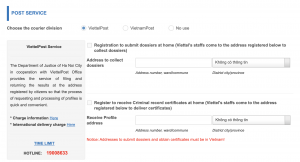There are many reasons why a foreigner in Vietnam would need a copy of the judicial certificate. This document will prove if you have a previous criminal conviction or not.

|
THE GOVERNMENT –
Số: 111/2010/ND-CP
|
SOCIALIST REPUBLIC OF VIET NAM
Independence – Freedom – Happiness
Ha Noi, date 23 month 11 year 2010
|
Pursuant to the December 25, 2001 Law on Organization of the Government;
Pursuant to the June 17, 2009 Law on Judicial Records;
At the proposal of the Minister of Justice,
This Decree details and guides the implementation of Clause 2, Article 11 on the organization of the National Center for Judicial Records; Article 14 on protection and archive of judicial record databases; Article 56 on search, sharing or provision of judicial record information available before the effective dale of the Law on Judicial Records for the development of judicial record databases, issuance of judicial record cards, and some other issues in the Law on Judicial Records.
1. The Ministry of Justice shall direct the development of the judicial record database for the whole country, and direct and guide the development of judicial record databases in localities.
2. Provincial-level People’s Committees shall direct the development of judicial record databases in their localities.
3. Concerned ministries and sectors shall direct their attached agencies and units in coordinating and providing judicial record information for the development of judicial record databases under the Law on Judicial Records and this Decree.
Judicial record databases constitute a national property and must be strictly and safely protected. The management and exploitation of judicial record databases must comply with the Law on Judicial Records and this Decree.
The National Center for Judicial Records is a non-business unit of the Ministry of Justice functioning to develop and manage judicial record databases nationwide.
The tasks, powers and organizational structure of the National Center for Judicial Records shall be decided by the Minister of Justice.
1. Agencies managing databases on population, civil status registration, household registration and people’s identity cards shall provide necessary information at the request of the National Center for Judicial Records and provincial-level Justice Departments for verifying personal identifications of convicts and persons banned from holding certain posts, or establishing or managing enterprises or cooperatives.
2. The National Center for Judicial Records and provincial-level Justice Departments shall provide judicial record information at the request of agencies managing databases on population, civil status registration, household registration and people’s identity cards to serve the latter’s work under the Law on Judicial Records and this Decree.
1. The Ministry of Finance shall guide rates and the collection, remittance, management and use of the fee for issuance of judicial record cards.
2. The following persons are exempt from the fee for issuance of judicial record cards:
a/ Members of poor households as specified by law;
b/ Inhabitants in communes meeting with exceptional difficulties as specified by law.
The development of a judicial record database cover:
1. Receiving, verifying, classifying and processing judicial record information provided by agencies and organizations under the Law on Judicial Records and this Decree.
2. Making judicial records under the Law on Judicial Records and this Decree.
3. Updating judicial records already made.
The National Center for Judicial Records and provincial-level Justice Departments shall develop judicial record databases on previous criminal convictions of the following persons:
1. Persons convicted by Vietnamese courts from July 1, 2010, or afterwards.
2. Persons convicted by Vietnamese courts before July 1, 2010, whose judicial record information is provided by competent agencies or organizations under Articles 16 thru 21 of the Law on Judicial Records to the National Center for Judicial Records and provincial-level Justice Departments from that date on.
3. Persons convicted by Vietnamese courts before July 1, 2010, whose previous criminal conviction status is informed by police offices, courts or competent agencies of the Ministry of National Defense to the National Center for Judicial Records and provincial-level Justice Departments from that date on for issuance of judicial record cards.
4. Vietnamese citizens convicted by foreign courts, whose excerpts of previous criminal sentences or convictions are provided by the Supreme People’s Procuracy to the National Center for Judicial Records from July 1, 2010 on.
5. Vietnamese citizens convicted by foreign courts who are transferred for serving their imprisonment sentences in Vietnam from July 1, 2010 on.
1. Agencies and organizations shall provide judicial record information available from July 1, 2010, to the National Center for Judicial Records and provincial-level Justice Departments under Articles 16 thru 21 of the Law on Judicial Records.
2. In case judicial record information available before July 1. 2010, is also required for the development of a judicial record database on convicts specified in Clauses 2 and 3, Article 8 of this Decree, the National Center for Judicial Records and provincial-level Justice Departments shall request in writing courts that have conducted first-instance trials of criminal cases involving these persons to provide copies of judgments against these convicts, and competent agencies of the Ministry of Public Security, the Ministry of National Defense, civil judgment enforcement agencies, and concerned agencies and organizations to provide information on complete serving of penalties, special reprieve, general amnesty, execution of the penalty of fine or confiscation of assets, and civil decisions in criminal judgments against convicts.
Competent agencies of the Ministry of Public Security, the Ministry of National Defense, civil judgment enforcement agencies, and concerned agencies and organizations shall provide information at the request of the National Center for Judicial Records and provincial-level Justice Departments under this Clause.
The National Center for Judicial Records and provincial-level Justice Departments shall compile judicial records of persons convicted by courts on July 1, 2010, or afterwards on the basis of judicial record information on previous criminal convictions provided by agencies and organizations under Articles 16 thru 21 of the Law on Judicial Records.
1. For persons convicted by Vietnamese courts before July 1, 2010, whose judicial record information on previous criminal convictions is received by the National Center for Judicial Records and provincial-level Justice Departments from that date on, the Center or Departments shall request in writing competent agencies to provide information under Clause 2, Article 9 of this Decree for the compilation of judicial records of these convicts.
2. After receiving copies of judgments and other information provided by courts and concerned agencies and organizations under Clause 1 of this Article, the National Center for Judicial Records and provincial-level Justice Departments shall compile judicial records of convicts.
1. For persons convicted by Vietnamese courts before July 1, 2010, whose previous criminal conviction status is informed by police offices, courts or competent agencies of the Ministry of National Defense to the National Center for Judicial Records and provincial-level Justice Departments from that date on for issuance of judicial record cards, the National Center for Judicial Records and provincial-level Justice Departments issuing judicial record cards shall compile judicial records of these persons.
2. In case information on previous criminal convictions of convicts is also required for making their judicial records under Clause 1 of this Article, the National Center for Judicial Records and provincial-level Justice Departments shall request in writing competent agencies to provide such information under Clause 2, Article 9 of this Decree.
1. Provincial-level Justice Departments shall receive excerpts of bankruptcy declaration decisions which take effect on July 1, 2030 or afterwards provided by courts under Article 37 of the Law on Judicial Records for making judicial records of persons banned from holding certain posts, or establishing or managing enterprises or cooperatives.
2. In case persons banned from holding certain posts, or establishing or managing enterprises or cooperatives already have judicial records, provincial-level Justice Departments shall write in their judicial records the contents specified in Clause 2, Article 38 of the Law on Judicial Records.
1. Provincial-level Justice Departments of localities in which persons banned from holding certain posts, or establishing or managing enterprises or cooperatives permanently reside shall compile judicial records of these persons. in case such a person has no place of permanent residence, the provincial-level Justice Department of the locality in which he/she temporarily resides shall make his/her judicial record.
2. A judicial record shall be made separately for each person banned from holding certain posts, or establishing or managing enterprises or cooperatives, containing the following details:
a/ Full name, sex, date and place of birth, nationality, place of permanent residence or temporary residence of the person;
b/ Posts banned from holding or duration in which he/she is banned from establishing or managing enterprises or cooperatives;
c/ Serial number and date of the decision on bankruptcy declaration and the issuing court
Quarterly, provincial-level Justice Departments shall coordinate with provincial-level and district-level people’s courts in their localities in reviewing and comparing criminal judgments and decisions on declaration of bankruptcy of enterprises or cooperatives, which have been pronounced by provincial-level or district-level courts and contain the ban on holding certain posts, or establishing or managing enterprises or cooperatives, in order to assure the timely provision of sufficient judicial record information.
1. In the course of updating judicial records, if information on personal identifications of convicts or persons banned from holding certain posts, or establishing or managing enterprises or cooperatives is unclear or inaccurate, the National Center for Judicial Records and provincial-level Justice Departments shall coordinate with agencies managing databases on population, civil status registration, household registration and people’s identity cards in verifying and clarifying such information.
2. When issuing decisions permitting modification or correction of civil status registrations for persons aged full 14 years or older, or death certificates, civil status registry offices shall send originals or copies of such decisions or death certificates to the National Center for Judicial Records and provincial-level Justice Departments.
1. In case a convict has passed a duration long enough for automatic remission of his/her previous criminal conviction under the Penal Code but has not received any certificate of remission of previous criminal conviction from a court, a provincial-level Justice Department shall verify whether or not he/she is charged with a criminal act. investigated, prosecuted or tried while having his/her previous criminal conviction not yet remitted. The verification shall be conducted as follows:
a/ The provincial-level Justice Department shall send a written request for verification or directly conduct the verification at the People’s Committee of the commune, ward or township (below referred to as commune-level People’s Committee) or the agency or organization in which the convict resides or works after completely serving his/her judgment;
b/ In the course of verification at the commune-level People’s Committee, agency or organization, itquot; finding necessary, the provincial-level Justice Department may conduct the verification at the concerned procedure-conducting agency of whether or not the convict is currently charged with a criminal act, investigated, prosecuted or tried.
2. The commune-level People’s Committee, agency or organization shall provide information at the request of the provincial-level Justice Department.
Justice-civil status officers shall assist the commune-level People’s Committee in conducting the verification at the request of the provincial-level Justice Department.
3. The provincial-level Justice Department shall send verification results to the National Center for Judicial Records within 5 working days after the verification is completed under Clause 1 of this Article.
4. For a judicial record compiled by the National Center for Judicial Records under Point a. Clause 2, Article 26 of the Law on Judicial Records, the National Center for Judicial Records shall verify the condition on automatic remission of the previous criminal conviction of the convict under Clause 1 of this Article.
Based on verification results obtained under Article 17 of tills Decree, the National Center for Judicial Records and provincial-level Justice Departments shall update in judicial records of convicts as follows:
1. Writing in a convict’s judicial record that he/she “has the previous criminal conviction remitted”; if he/she falls into any of the following cases:
a/ He/she commits no new crime in the duration of having a previous criminal conviction as stipulated in the Penal Code;
b/ He/she has a previous criminal conviction for a crime but is convicted or investigated, prosecuted or tried for another criminal act committed before or after the duration of having such previous criminal conviction as stipulated in the Penal Code.
2. In case a person who has a previous criminal conviction for a crime is again convicted under a legally valid judgment for a criminal act committed in the duration of having such previous criminal conviction as stipulated in the Penal Code, his/her judicial record must be updated with the information that he/she “has a previous criminal conviction” for such crime.
3. In case a person who has a previous criminal conviction for a crime is investigated, prosecuted, tried or convicted under a judgment which has not become legally effective for another criminal act committed in the duration of having such previous criminal conviction as stipulated in the Penal Code, his/her judicial record will not be updated with the information on automatic remission of previous criminal conviction until court trial results are obtained.
1. A judicial record database consists of documented judicial record files and electronic judicial record data.
2. Documented judicial record files include documents containing judicial record information sent by concerned agencies and organizations to the National Center for Judicial Records and provincial-level Justice Departments under Articles 16 thru 21 of the Law on Judicial Records and judicial records of individuals compiled by the National Center for Judicial Records and provincial-level Justice Departments.
3. Electronic judicial record data include judicial record information contained in documented judicial record files which have been converted into electronic data.
4. Both documented judicial record files and electronic judicial record data can serve as a ground for determining whether or not a person has a previous criminal conviction, is banned from holding certain posts, or establishing or managing enterprises or cooperatives in case such enterprises or cooperatives are declared bankrupt by courts.
1. The archive of documented judicial record files must adhere to the principles that files are separately classified for different individuals and each file has separate signs to ensure accurate and convenient information search.
2. Copies of criminal judgments, excerpts of criminal judgments and criminal judgment enforcement decisions, certificates of complete serving of penalty and judicial records of individuals shall be archived at the National Center for Judicial Records and provincial-level Justice Departments until such individuals die.
Other documents in judicial record files shall be archived definitely and might be destroyed when they are no longer useful under the law on archive.
1. Electronic judicial record data shall be obtained through digitalizing documented judicial record files, structured to be consistent with documented judicial record files and archived indefinitely at the National Center for Judicial Records and provincial-level Justice Departments.
2. In case of inconsistency between electronic judicial record data and documented judicial record files, the National Center for Judicial Records and provincial-level Justice Departments shall conduct verification before making appropriate adjustments.
1. The management and exploitation of judicial record databases must comply with the Law on Judicial Records and this Decree.
2. Civil servants and public employees working in the National Center for Judicial Records and provincial-level Justice Departments may access judicial record databases within the scope of their vested powers and assigned duties and tasks.
3. The Minister of Justice shall guide the management, use and exploitation of judicial record databases.
The National Center for Judicial Records and provincial-level Justice Departments shall take measures to assure safety and security for judicial record databases.
1. General protective measures:
a/ Measures against data hacking;
b/ Measures against fires, explosions and natural disasters.
2. Measures to protect documented judicial record files:
a/ Building or arranging storehouses up to set standards;
b/ Installing sufficient technical equipment and devices for file preservation;
c/ Maintaining appropriate temperature, humidity and light for file preservation;
d/ Controlling insects and fungi or neutralizing acids and other elements harmful to files;
e/ Repairing or restoring files which are damaged or in danger of damage.
3. Measures to protect electronic judicial record data:
a/ Assuring data safety and security;
b/ Assuring network security.
1. The search for judicial record information on previous criminal convictions available before July L 2010, for issuance of judicial record cards shall be conducted on the database of the public security force as specified in Article 25 of this Decree.
2. In case results of search for information on the database of the public security force are insufficient to serve as a ground for concluding on the previous criminal conviction status of an applicant for judicial record card or such an applicant falls into a case specified in Article 27 of this Decree, the National Center for Judicial Records or the provincial-level Justice Department shall contact the court or a competent agency of the Ministry of National Defense for search for information under Article 26 or Article 27 of this Decree.
3. In case a judicial record database contains sufficient judicial record information available before July 1, 2010, on persons specified in Clauses 2 and 3, Article 8 of this Decree, the search for information shall be conducted on such database.
1. In case a provincial-level Justice Department issues a judicial record card, the search for information shall be conducted as follows:
a/ Within 1 working day after receiving a complete and valid dossier of application for judicial record card, the provincial-level Justice Department shall send a card of judicial record verification enclosed with a file set to the provincial-level Police Department;
b/ Within 7 working days after receiving the card of judicial record verification, the provincial-level Police Department shall search for information on the previous criminal conviction status of the applicant and send search results to the provincial-level Justice Department. In case search for information have to be conducted in the file and record system of the Ministry of Public Security, that time limit must not exceed 9 working days.
2. In case the National Center for Judicial Records issues a judicial record card, the search for information shall be conducted as follows:
a/ Within 1 working day after receiving a complete and valid dossier of application for judicial record card, the National Center for Judicial Records shall send a card of judicial record verification enclosed with a file set to the agency managing the file and record system of the Ministry of Public Security;
b/ Within 7 working days after receiving the card of judicial record verification, the agency managing the file and record system of the Ministry of Public Security shall search for information and send search results to the National Center for Judicial Records.
3. In case of emergency and at the request of a procedure-conducting agency, immediately after receiving an application, the National Center for Judicial Records or a provincial-level Justice Department shall coordinate with a competent agency of the Ministry of Public Security in searching for judicial record information of the application and issue a judicial record card within 24 hours after receiving the application.
In case judicial record information on previous criminal convictions searched at a court is insufficient to serve as a ground for making a conclusion or the previous criminal conviction status of an applicant remains unclear or contains insufficient details for confirming whether or not the applicant has a previous criminal conviction, the National Center for Judicial Records or the provincial-level Justice Department shall contact the court that has conducted the first-instance trial of the case involving the applicant for information search.
The time limit for searching information at a court is 5 working days.
In case of issuance of a judicial record card to a person who once was an officer,commissioned officer, solider or professional army man, or national defense worker, the National Center for Judicial Records or the provincial-level Justice Department shall coordinate with a competent agency of the Ministry of National Defense in conducting information search.
For a person who obtains a judicial record card on July 1, 2010, or afterwards and is determined as having no previous criminal conviction before July 1, 2010, the second-time issuance of a judicial record card to him/her does not require search for information at a police office, court or competent agency of the Ministry of National Defense under this Chapter.
This Decree takes effect on January 10, 2011.
1. Ministers, heads of ministerial-level agencies, heads of government-attached agencies and chairpersons of provincial-level People’s Committees shall implement this Decree.
2. The Minister of Public Security shall direct units of the Ministry and local police offices; and the Minister of National Defense shall direct concerned agencies and units in the Army in organizing the search, exchange and provision of judicial record information available before July 1, 2010, under the Law on Judicial Records and this Decree to serve the development of judicial record databases and the issuance of judicial record cards.
3. The Minister of Justice shall, within the ambit of his/her tasks and powers, coordinate with concerned ministries and sectors in guiding the implementation of articles and clauses of this Decree assigned to him/her and other necessary contents of the Decree in order to meet requirements of the state management of judicial records.
How Much Does It Cost For A Judicial Record Certificate in Vietnam? [show answer]
👉 It costs VND 200 000 (around US$10) for Vietnamese people, foreigners living in Vietnam or abroad.
👉 👉 It cost VND 100 000 (around US$5) for Vietnamese pupils, students, people contributing to the Revolution, relatives of martyrs.
👉 👉 👉 It’s free for Vietnamese poor families, families in difficult circumstances stated in laws.
For support, please email to info@vietnamimmigration.org

*** If you send and receive your documents via post service, you have to pay fee for post service


There are many reasons why a foreigner in Vietnam would need a copy of the judicial certificate. This document will prove if you have a previous criminal conviction or not.

THE NATIONAL ASSEMBLY ——- SOCIALIST REPUBLIC OF VIETNAM Independence – Freedom – Happiness ———- No. 28/2009/QH12 Hanoi, June 17, 2009 LAW ON JUDICIAL RECORDS (No.